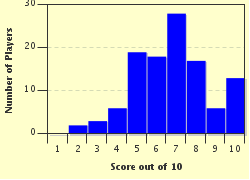Quiz Answer Key and Fun Facts
1. How did the Greeks announce their victory at Troy to the people back home? What did they use?
2. Why did the Greek Histaieus order his secret messenger to shave his head?
3. Which famous queen paid dearly when her secret code was deciphered?
4. Horatio Nelson's famous message "England expects that every man will do his duty" was transmitted by way of which of these?
5. When in 1952 the message "It's a boy!" was exchanged between two U.S. agencies, what did it mean?
6. The British Dicken Medal is awarded to _____ .:
7. An unbreakable code created for WWII, was spoken by who?
8. In 1966, how did Jeremiah Denton, a US Navy pilot prisoner of the North Vietnamese, convey on television some secret information?
9. On June 5, 1944, the BBC broadcast the line of a poem to alert the French Resistance that the D-Day invasion was on. Who had written the poem?
10. What famous person was known as "Corporal Violet"?
Source: Author
russalka
This quiz was reviewed by FunTrivia editor
bloomsby before going online.
Any errors found in FunTrivia content are routinely corrected through our feedback system.


